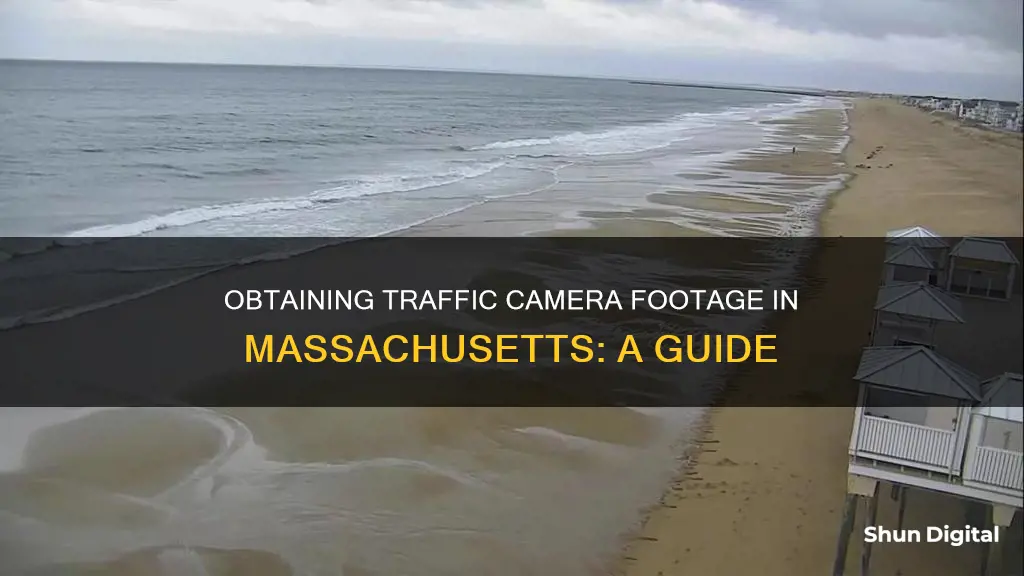
Obtaining traffic camera footage in Massachusetts can be challenging. While there are traffic cameras in the state, it is rare for them to record car accidents or for the footage to be stored for victims. If you are looking to obtain traffic camera footage after a car accident, it is recommended to enlist the help of an experienced attorney. They can help you identify the relevant camera and contact the necessary agencies to access the footage if it exists.
| Characteristics | Values |
|---|---|
| Difficulty of obtaining traffic camera footage | It is challenging to obtain traffic camera footage after a car accident in Massachusetts. |
| Role of an attorney | An experienced attorney can improve your chances of obtaining traffic camera footage by contacting the necessary agencies. |
| Storage of traffic camera footage | Traffic camera footage is often not stored for very long, if at all. |
| Types of traffic cameras | Red-light cameras, speed cameras, and cameras in construction zones are the most likely to capture accidents. |
| Other evidence | In the absence of traffic camera footage, other evidence such as security camera footage, eyewitness testimony, and police reports can be used to support a compensation claim. |
What You'll Learn

Identifying the relevant camera
If you are looking to obtain traffic camera footage in Massachusetts, it is important to identify the specific camera that recorded the incident. Here are some steps to help you in this process:
- Determine the precise location of the camera: Knowing the exact location of the camera that may have captured the footage is crucial. This information will help you in your efforts to obtain the desired footage.
- Analyse the area for potential sources of footage: Besides traffic cameras, other potential sources of footage include surveillance systems from nearby buildings or businesses, red-light cameras, security cameras, and more. Consider all the possibilities to increase your chances of finding the relevant camera.
- Contact the law enforcement agency that prepared your police report: The law enforcement agency that responded to your incident might possess camera footage from the accident scene. They may also be aware of any nearby surveillance cameras that could have recorded the event. Provide them with detailed information about the accident, including the date, time, location, and any other relevant details.
- Identify the type of camera: Different types of cameras have different procedures for accessing footage. For example, if the accident occurred near a construction site, the relevant camera may be managed by the Massachusetts Department of Transportation (MassDOT) or the local city or county office. On the other hand, if it was a red-light or speed camera, these are typically monitored and controlled by local law enforcement agencies.
- Engage the help of an attorney: Obtaining traffic camera footage can be challenging, and an experienced attorney can significantly enhance your chances of success. They can swiftly take action and communicate with the relevant agencies to secure the necessary evidence.
Remember, it is uncommon for traffic cameras to capture footage of car accidents, and even if they do, the maintaining agencies rarely store the footage for extended periods. Therefore, it is essential to act quickly and be prepared for potential challenges when identifying the relevant camera and obtaining the desired footage.
Powering Your Reverse Camera: Connecting to Car Stereo
You may want to see also

Contacting the relevant authority
If you are seeking traffic camera footage following a road traffic accident in Massachusetts, it is important to act quickly. The relevant authority for traffic camera footage will depend on the type of road and the location of the incident.
The Massachusetts Department of Transportation (MassDOT) manages highway traffic cameras. If your accident occurred on a highway, MassDOT is likely to be the authority to contact. You should contact them directly, or through their respective city or county office. It is advisable to have a lawyer coordinate this communication to ensure the correct procedure is followed.
If your accident occurred on a road that is not a highway, the police department that responded to the incident will be the relevant authority. You will need to contact the records department and request a copy of the report. This can usually be done in person, over the phone, or online. There is usually a fee for obtaining a copy of a police report, and you should expect to wait a little while for the report to be processed, especially if the accident is still under investigation.
It is important to note that it is uncommon for traffic cameras to capture or store footage of accidents, and the storing of such footage is not guaranteed. The storing of footage is also usually time-limited, so it is important to act fast. If you believe a traffic camera has captured an incident, you should contact an attorney as soon as possible.
Beach Camera Sales Tax: What You Need to Know
You may want to see also

Submitting a public records request
Step 1: Identify the Relevant Camera(s)
Begin by identifying the precise location of the camera(s) that may have recorded the footage you require. This could be a traffic camera, a red-light camera, a speed camera, or a camera from a nearby business or residence. Analyze the area to discover potential sources of footage.
Step 2: Contact the Relevant Authority
Under the Massachusetts Public Records Law, you have the right to access certain records, including police reports and, in some cases, traffic camera footage. The Massachusetts Department of Transportation (MassDOT) manages highway traffic cameras, so they may be your point of contact. Alternatively, you can reach out to the respective city or county office that manages the specific traffic camera.
Step 3: Submit a Written Request
To access police reports or traffic camera footage, you must submit a written request to the Records Access Officer of the respective police department or government agency. Be sure to include all relevant information, such as the date, time, location, and any individuals involved in the incident. You can also state your preferred format for receiving the records, such as electronic copies.
Step 4: Be Prepared for Fees and Waiting Periods
There may be fees associated with obtaining the requested footage or records. These fees typically cover the costs of retrieving and duplicating the information. Additionally, keep in mind that receiving the requested information may take some time, especially if the accident is still under investigation or if the records need to be compiled from multiple sources.
Step 5: Act Promptly
It is important to act quickly when requesting traffic camera footage, as this type of footage is often not stored for extended periods. The storing period for traffic camera footage can vary, and some agencies may not retain it at all. Therefore, submitting your request as soon as possible increases your chances of successfully obtaining the desired footage.
While obtaining traffic camera footage in Massachusetts can be challenging, carefully following these steps can improve your chances of success. Remember that an experienced attorney can also assist you in navigating this process and help you build your case.
Camera Battery Draining Fast? Here's Why and How to Fix It
You may want to see also

Paying any required fee
If your request for traffic camera footage is approved, you may be required to pay a fee. This fee covers the expenses related to retrieving and duplicating the requested footage. The fee amount may vary depending on the specific circumstances of your case and the procedures of the relevant department. It's important to note that traffic camera footage is not typically stored for extended periods, so you should make your request as soon as possible after the event.
The process of obtaining traffic camera footage can be challenging, and it is recommended to seek the help of an experienced attorney. An attorney can guide you through the process, identify the relevant cameras, and communicate with the necessary agencies to secure the required evidence. They can also assist in determining if any pertinent footage exists and help you understand your rights under the Massachusetts Public Records Law.
It's worth noting that not all records are publicly accessible, and there may be privacy concerns involved in acquiring certain information. Additionally, the availability of traffic camera footage depends on the maintaining agencies, and it is uncommon for them to store footage for extended periods. Therefore, it is advisable to act promptly and consult a legal professional for detailed advice tailored to your specific situation.
While obtaining traffic camera footage can be difficult, it can be crucial evidence in building your case. If you believe that a traffic camera captured footage of your accident, it is important to take immediate action to increase your chances of obtaining the necessary evidence. An experienced attorney can help you navigate the process and improve your chances of success.
Hide Your Backdrop with a Virtual Camera Background
You may want to see also

Hiring an attorney
If you are considering hiring an attorney to obtain traffic camera footage in Massachusetts, there are several factors to keep in mind. Obtaining traffic camera footage can be challenging and often requires swift action. Here are some key points to consider:
Experience and Legal Knowledge
Experienced traffic attorneys, particularly those familiar with Massachusetts laws, will know the best course of action to obtain traffic camera footage. They understand the procedures and local regulations regarding evidence collection. Their knowledge of the tendencies of judges, law enforcement, and local agencies can be invaluable in navigating the process effectively.
Swift Action to Preserve Footage
Traffic camera footage is often not stored for an extended period, if at all. Municipalities and departments responsible for maintaining this footage may have varying retention policies. A skilled attorney will act quickly to contact the relevant agencies and initiate the process of obtaining the necessary footage before it is too late.
Identifying Relevant Cameras
An attorney can help identify the precise location of cameras that may have recorded the incident. They will analyze the area to discover potential sources of footage, including traffic cameras, surveillance systems from nearby buildings, red-light cameras, security cameras, and more. This comprehensive approach increases the chances of obtaining useful footage.
Communicating with Agencies
Attorneys have the resources and experience to effectively communicate with the necessary agencies to access the footage. They know which departments to contact and how to navigate the process of requesting and obtaining evidence. They can also determine if a subpoena is required to obtain the information.
Representing You in Court
If you are facing a traffic violation or seeking compensation after an accident, an attorney can represent you in court. They can provide informed legal advice, negotiate on your behalf, and increase your chances of a favorable outcome. Their presence can be especially beneficial if you have multiple tickets or are facing serious charges.
Cost Considerations
The cost of hiring an attorney is an important factor to consider. The fees charged by attorneys can vary, and in some cases, the cost may be similar to or exceed the amount of a traffic ticket fine. However, it's important to weigh the potential benefits against the cost, as an attorney can provide valuable assistance and improve your chances of a positive resolution.
Are Monitors Spying on You? Cameras and Microphones Explained
You may want to see also
Frequently asked questions
It can be challenging to obtain traffic camera footage in Massachusetts as it is rare for these cameras to record accidents and the footage is not stored for very long.
The types of traffic cameras that could potentially film an accident include red-light cameras, speed cameras, and cameras in construction zones.
It is recommended to enlist the help of an experienced attorney as they can swiftly contact the relevant agencies to secure the necessary evidence.







